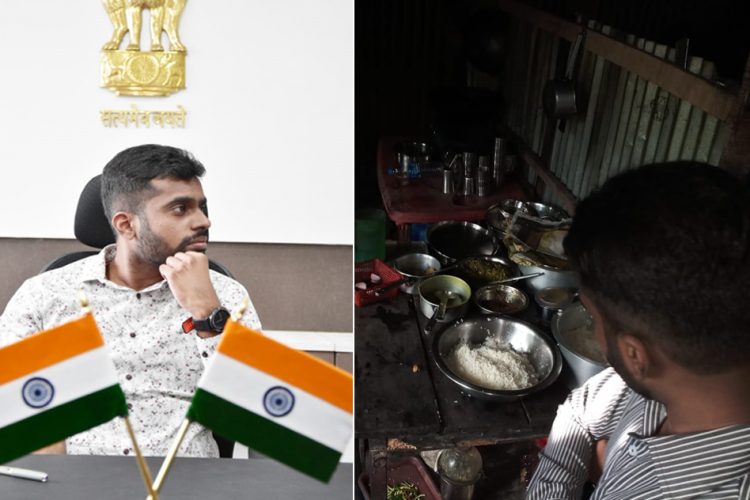
Just a few months back, there were several reports of rotten meat being sold in West Bengal. A 2011-batch Indian Administrative Service officer, Nikhil Nirmal, who was recently appointed the District Magistrate (DM) of Alipurduar, West Bengal is making sure that there are better hygiene and food safety measures in his district.
In 2014, Alipurduar was given the status of a separate district after bifurcating from itself parental district Jalpaiguri. Alipurduar is four hours drive (200 Km) away from Jalpaiguri district. Alipurduar’s DM, Nikhil took the job in June 2017. As soon as he was appointed as the DM, he made sure that his district has better food and safety measures as it is the “most basic need”.
“It is not just West Bengal who do not follow proper guidelines for food safety as a public health issue. Most states in India are reeling through the same problem. This issue should properly be taken care of, as it is one of the basics for a healthy life,” says Nikhil, speaking to The Logical Indian. According to a report, Subhash Dutta, environmental activist and lawyer said “West Bengal is a paradise of adulteration and hell as far as checks of food safety are concerned.
He told us that, the Food Inspector (FI) of Jalpaiguri district takes care of the inspection in both the areas since the post of Food Inspector under the Alipurduar Municipality is vacant. “As Alipurduar is quite far from Jalpaiguri, the inspector would rarely come for any inspections here. When I noticed this, I asked the FI to come for inspection every week, and now he visits the district every Wednesday,” he said.
This measure was not enough for the officer, who recently lost one of his close friends due to food poisoning after eating in a restaurant in his hometown Kochi, Kerala.
The First raid
“On July 11, I mentioned poor food safety conditions in my district during an administrative meeting where Kolkata Chief Minister Mamata Banerjee was also present. In the meeting, the CM did emphasise on the need for food safety measures in the state. Very soon after that, I gave the orders for the raids to be conducted in the district to check if eatery shops are following the proper guidelines or not,” said Nikhil (31).
Two weeks after the meeting with the CM, the first raid was conducted in Alipurduar. “With a team of officials, we also took videographers to take the videographic evidence of these shops. When we went to many restaurants in the markets, we found out that these shops did not have the Food Safety and Standards Authority of India (FSSAI) licence with them, which is mandatory for anyone who is manufacturing food and selling it,” he said. According to the officer, three restaurants were shut down after the raid.
No FSSAI licence
“As Alipurduar is a small district, many of these restaurants owners do not know how to get an FSSAI licence and why it is important, so I decided to organise an awareness camp for the people to understand the need of it,” he added.
The camp was organised where food merchants were educated about the importance of health and hygiene. They were also asked to fill out an online form to get FSSAI credentials.
“I assume that getting an FSSAI license is important, but it is a bit lengthy and technical process to ensure that restaurant owner and the sweet shop owners from where a lot of people consume food should immediately take proper health and hygiene measures,” said the 31-year-old.
Considering the urgency of the situation, the officer ordered for the second round of raid in the district. This time the motive of the inspection was to check if these places have a sanitary condition to eat or not.
The second raid
“During the raid, we found out fungus infected food kept in these kitchens. In most of these shops, food was being cooked, but the cooks were not wearing gloves, apron and headgear. The same cooking oil was being used multiple times, which is also an unhealthy practice. There was cockroach encroachment in the kitchens too,” he added.
This time four shops were sealed off. Out of the four, three were renowned sweet shops in the area and one was a restaurant where most middle-class people would go to eat, told the officer. When we asked him, what are the proper guidelines that should be followed by restaurants for standard food safety he said that many rules are to be followed by any shop that is selling food items. First is an FSSAI licence, the regular pest control should be down, and the owner should have a pest control licence. Proper gear should be used while cooking. Kerosene oil is strictly not allowed to be used. Utensils for serving food should be replaced every year and a few more.
The officer also told us that a special task force has also been constituted to ensure proper check and the task force will also take care of awareness of the people. “After the raids, we have received more than 300 applications for FSSAI. Till now there is a good response from the people. We have got an affidavit signed from few of the sealed shoppes, that they will follow the standard protocol now,” said Nikhil Nirmal. He further says that how in many foreign countries, there is a food safety rating board outside restaurants and India should also adopt something similar.
Talking about the West Bengal food safety measures, Nikhil said because many administrative places are vacant in the state, there is a lack of scrutiny. According to the Indian Express, West Bengal is among several states in the country plagued by a shortage of food safety officers. Food safety officers from FSSAI said that the requirement was to have 180 safety officers in Bengal, but at present, there are only 42 officers.
No comments:
Post a Comment